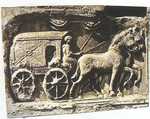 It's usually painful for employees and owners when industries become obsolete. Exceptions include the pyramid-makers - the slaves were no doubt relieved when that particular trend came to a halt.
It's usually painful for employees and owners when industries become obsolete. Exceptions include the pyramid-makers - the slaves were no doubt relieved when that particular trend came to a halt. As the current economic crisis deepens, it's putting more and more categories of business under threat, and many sectors are still feeling the impact of the internet on their old business models.
A friend of mine is fond of the metaphor of the buggy whip manufacturers who got put out of work by the arrival of the car industry - as the demand for horse-drawn carriages fell, they failed to diversify. No-one cried for them, least of all the horses.
Now the wheel of fortune has turned and the car industry itself is in trouble across the globe. Demand is falling, bailouts are being demanded, and bankruptcy looms large. Their desperate measures to survive seem doomed, and their efforts to get off fossil fuels and into electric seem so tokenistic.
Newspapers are another matter, though, although the comparison isn't new. Today's ABCs, the circulation gospel, show every publication in Scotland down apart from the Times and Sunday Times. They shouldn't feel smug, though. Last time I looked it was only the Telegraph and Sunday Telegraph who held their own, and everyone's trendline is downwards. Collectively, just looking at the dailies, they lost just short of 108,000 readers in the last year, presumably mostly to the web.
In America, papers are closing left and right. Here there have been job cuts at the Guardian, the Independent, the Sunday Mail and the Record, the Sunday Herald and the Herald, and others. At the local end, there's been a net loss of 42 papers across the UK, but no major nationals have folded here. Yet.
The Scottish Government and COSLA are doing their bit to hasten the end. They're advertising online, instead of in the papers, and saving £10m doing so. As a taxpayer, I'm obviously happy to see Government save money, and searching online is easier for many than remembering to get the Friday papers.
However, the newspapers aren't just advertising sheets. I don't want to see the Scotsman collapse just to be replaced by Craigslist. The advertising sections fund actual journalism, investigation and news-gathering (and yes, the mere reprinting of press releases too).
Part of the problem with making the case for journalists is that they often share last place with politicians in polls about who the public trust, at least prior to the bankers' collective fall from grace. Despite their many failings, though, journalists provide a real public good, holding public figures to account and shedding light on malpractice.
Bloggers won't fill the gap, either, as David Simon (originator of The Wire) found out when he investigated a fatal shooting by the Baltimore police:
"Well, sorry, but I didn't trip over any blogger trying to find out McKissick's identity and performance history. Nor were any citizen journalists at the City Council hearing in January when police officials inflated the nature and severity of the threats against officers. And there wasn't anyone working sources in the police department to counterbalance all of the spin or omission.
"I didn't trip over a herd of hungry Sun reporters either, but that's the point. In an American city, a police officer with the authority to take human life can now do so in the shadows, while his higher-ups can claim that this is necessary not to avoid public accountability, but to mitigate against a nonexistent wave of threats. And the last remaining daily newspaper in town no longer has the manpower, the expertise or the institutional memory to challenge any of it."
If the slow-motion demise of the newspaper industry doesn't alarm you, you don't understand it. If the papers are to have a future it seems unlikely it's in print rather than online, but we'll be poorer and more vulnerable if they don't find some kind of viable business model to turn to.





